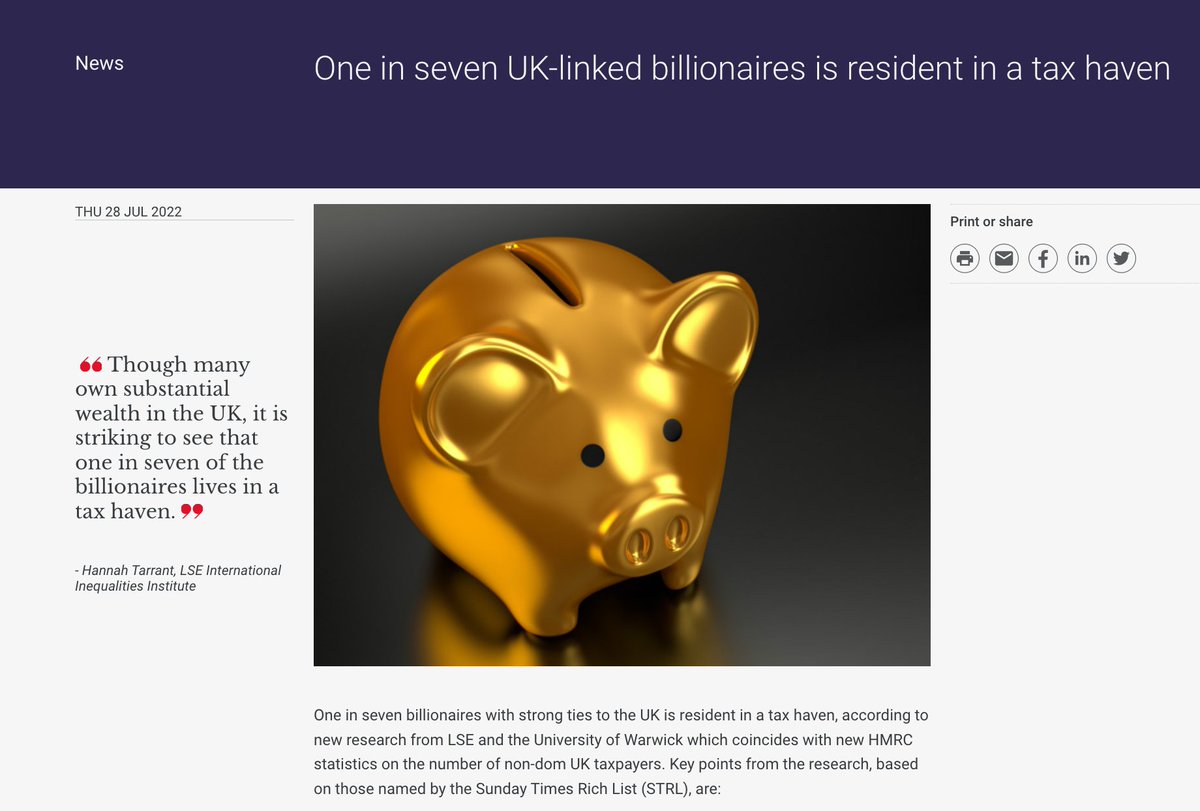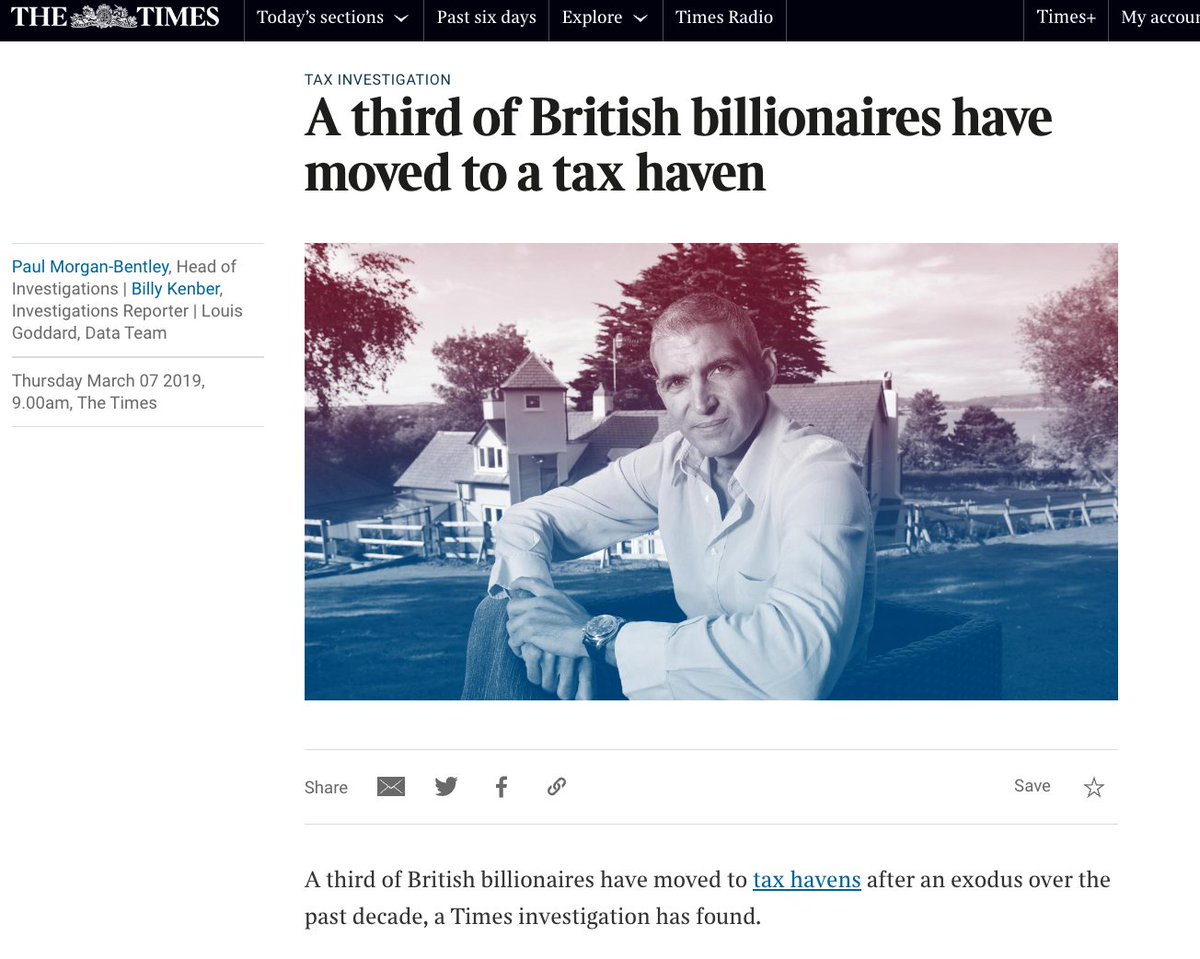A remarkable story in the Sunday Times that Lord Sugar tried to become a tax exile. He thought he'd avoid £186m of UK tax on some huge dividends, but ended up writing HMRC a £186m cheque.
A quick thread on why Sugar failed to become a tax exile, and why so many others succeed.
A quick thread on why Sugar failed to become a tax exile, and why so many others succeed.

So the answer as to why Lord Sugar failed to become a tax exile is easy. The CRGA means that, as a member of the House of Lords, he would have been UK tax resident whether he lived in Basingstoke, Sydney or on the Moon.
It's a fun story (not for Alan Sugar, and not for his advisers, who the Sunday Times says he's now suing).
But there's a bigger question: why does the UK make it so easy to become a tax exile?
But there's a bigger question: why does the UK make it so easy to become a tax exile?
There is a longstanding debate in some circles on whether, and to what extent, people in general move in response to high taxes.
I confess this always seems a little unreal to me. Just to start: Sir Jim Ratcliffe (Ineos), Toto Wolff (motorsport executive), Lewis Hamilton (racing), Tina Green, the Barclay brothers, Richard Branson, David and Simon Reuben (property), John Margreaves (Matalan),
Terry Smith (fund manager), Steve Morgan (housebuilder Redrow), David Rowland (financier), Joe Lewis (Tavistock Group), Anthony Buckingham (Heritage Oil), David Ross (Carphone Warehouse, Mark Dixon (IWG).
There are many more. Some estimate that one in seven British billionaires now live in tax havens; others one in three.




Looking at the Sunday Times "Rich List", I'm struck by how few of those listed still live in the UK. Most of these people left the UK for a very specific reason. They built up a successful business, and were about to make a large amount of money from it
They left the UK, sold the business (or received a large dividend) and made a large tax-free gain/profit. They became a tax exile.
There isn't a loophole or trick - its just that, like almost all other countries, the UK only taxes people who live here - who are "UK tax resident".
- A Frenchman in Paris won't be subject to UK tax on dividends from UK companies. If he moves to the UK, he'll become UK tax resident, and be subject to tax on that income
- A Brit living in London is of course UK resident, and subject to UK tax on her UK dividends. But if she leaves the UK, she'll no longer be taxed on those dividends.
This is sensible and uncontroversial. The UK has no business taxing people who don't live here.
It becomes more controversial if that Brit has spent her life in the UK growing a business, and is (say) sitting on an offer from someone to buy the business for £50m.
The UK has, by international standards, a pretty low rate of tax on capital gains - 20%. But if she leaves the UK and moves to a country that doesn't tax capital gains then she'll escape all tax on the £50m.
That used to mean going to a tedious tax haven like Monaco, but there are an increasing list of non-tax havens that don't tax recent immigrants on their foreign gains - e.g. Australia, Portugal and Israel.
Could we stop tax exiles?
Many countries try to, with "exit taxes".
Typically how this works is that, if you leave the country, the tax rules deem you to sell your assets now, and if there's a gain then you pay tax immediately (not when you later come to sell).
Many countries try to, with "exit taxes".
Typically how this works is that, if you leave the country, the tax rules deem you to sell your assets now, and if there's a gain then you pay tax immediately (not when you later come to sell).
Sometimes you can defer the tax until a future point when you actually sell the assets or receive a dividend.Of course, it works out more complicated than this in practice because it's tax, but the basic principle is both straightforward and fairly common.
Why didn't the UK create an exit tax years ago? We didn't have capital gains tax at all until 1968, and it was easy to avoid until the 90s. After that, we ran into a big problem with EU law, which greatly complicates exit taxes
So one new freedom the UK has post-Brexit is the ability to impose our own exit tax that has no leaks, and which the CJEU can't stop.
But should we have an exit tax?
There are, inevitably, two opposing views:
There are, inevitably, two opposing views:
One is that everyone is free to live where they wish, and if they move somewhere with lower tax, that's up to them. No Government has a right to tax people for leaving.
... The knowledge that high-earning individuals can skip the jurisdiction, imposes a useful pressure on governments to keep taxes low. And if we tried to stop them, they'd just leave earlier (or not come at all).
The other view is that if you spend years in the UK building up your business, it's only right that the UK should have the right to tax the gain you make on selling that business.
Or, more pragmatically, it seems counterproductive for the tax system to incentivise people to leave. This kind of "tax competition" is an undesirable infringement on countries' right to raise taxes, particularly on the wealthy.
What do I think? I'm not sure.
I'd want to see more evidence and analysis of the real-world impact of an exit tax. A poorly designed tax could put people off coming to the UK, or even accelerate departures (i.e. by causing entrepreneurs to flee as soon as things start going well, rather than waiting til exit)
And just discussing exit taxes can be dangerous, because if potential tax exiles think you're going to introduce an exit tax, they may skedaddle immediately.
Any exit tax would also have to be carefully designed to have no impact on people genuinely leaving the UK for other "normal" countries in which they'll be fully taxed on their future gains - just on people who leave for tax havens (but including places like Australia in that)
Any exit tax would have to be announced suddenly and with great fanfare, and made retrospective to the date of the announcement. This would be controversial, but otherwise there would be a mass exodus of the super-wealthy. This is all not easy.
And, In the interests of fairness, if we're introducing new rules for capital gains when people leave the UK, we should also look again at the capital gain rules when you arrive in the UK.
Right now if (for example), you build a business worth £100m from nothing, come to the UK and sell your business the next day, the UK will tax you on all £100m of gain. Even though little or none of that gain was made in the UK.
That feels unfair; and there is anecdotal evidence that it deters some entrepreneurs from moving here. So we should have an entry adjustment - "rebasing" the asset to its market value at the date you arrive in the UK.
So there is a case to be made for changing the law in both directions, and establishing a principle that the UK taxes gains made when you were in the UK, and doesn't tax gains made when you weren't. But any change needs to be implemented cautiously and with great care.
There's an expanded version of this thread, with plenty of footnotes, here: taxpolicy.org.uk/sugar
The Sunday Times article is here (paywall; but it's worth it): thetimes.co.uk/article/lord-a…
And full credit to @Gabriel_Pogrund and @edwardsiddons for a brilliant scoop.
Quick sidebar: @PickardJE reported the facts last year. I confess I was sceptical: I couldn't understand how Sugar could have become non-resident. Turns out Pickard's reporting was 100% correct and it was Sugar who'd got it wrong. Kudos to Pickard.
ft.com/content/a92aaf…
ft.com/content/a92aaf…
@NCanham Looking at my notes, Wolff was included because he *did* leave the UK for Monaco - but given he wasn't born here, and didn't make his money here, I agree that he doesn't really belong on the list.
@DannyYee but in Sugar's case I expect that was overridden by CRGA 2010 and the "tie-breaker" in the treaty
• • •
Missing some Tweet in this thread? You can try to
force a refresh

 Read on Twitter
Read on Twitter

















